|
July, 2005
Aug. 2005
Sept. 2005
Oct. 2005
Nov. 2005
Dec. 2005
Jan. 2006
Feb. 2006
Mar. 2006
Apr. 2006
May 2006
June 2006
July 2006
August 2006
September 2006
October 2006
November 2006
December 2006
January 2007
February 2007
March 2007
April 2007
May 2007
June 2007
July 2007
August 2007
September 2007
October 2007
November 2007
December 2007
February 2008
March 2008
April 2008
May 2008
June 2008
July 2008
August 2008
September 2008
October 2008
November 2008
December 2008
February 2009
March 2009
April 2009
May 2009
July 2009
August 2009
September 2009
November 2009
December 2009
January 2010
February 2010
March 2010
April 2010
May 2010
June 2010
July 2010
September 2010
October 2010
November 2010
December 2010
January 2011
February 2011
March 2011
April 2011
May 2011
June 2011
July 2011
September 2011
October 2011
December 2011
February 2012
April 2012
June 2012
July 2012
August 2012
October 2012
November 2012
February 2013
May 2013
July 2013
August 2013
October 2013
November 2013
April 2014
July 2014
October 2014
March 2015
May 2015
September 2015
October 2015
November 2015
August 2016
March 2017
January 2019
May 2019
August 2019
March 2020
April 2020
May 2020
July 2020
October 2020
January 2021
February 2021
August 2021
January 2022
February 2022
April 2022
June 2022
August 2022
September 2022
December 2022
February 2023
April 2023
August 2023
February 2024
March 2024
ČERVENÁ BARVA PRESS NEWSLETTER
Gloria Mindock, Editor Issue No. 118 May, 2024
INDEX
Welcome to the ČERVENÁ Barva Press May Newsletter, 2024
Hi Everyone-
Hope you are ready for this summer! We have many things happening in June.
It you live in the Washington DC area, please come join us on Sunday, June 2nd...
Currently, I am busy planning our second summit for October 4th, 5th and 6th. Stay tuned for details.
If any Cervena Barva Press authors will be at AWP in LA, please contact me. Cervena Barva Press and
Glass Lyre Press authors will be doing a reading off-site and Cervena will
be having a 20 year bash celebration too.
Coming soon!
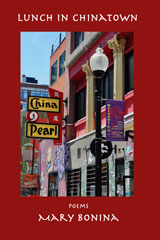
Lunch in Chinatown
by Mary Bonina
|
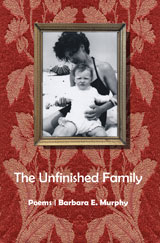
The Unfinished Family
by Barbar E. Murphy
|

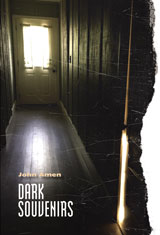
When did you first begin writing, John?
I was probably 10 or 11 when I started experimenting with poetic language and how it related to my own
budding need for expression. By 13 or 14, I was pretty committed to and I suppose you could say identified with the process.
Are there any poets that you like?
Well, I continue to be moved by the Greeks, Donne, and Shakespeare. My intro to modern poetry came when
I encountered W.S. Merwin, Audre Lorde, Sylvia Plath, Langston Hughes, then Sharon Olds, Charles Simic.
There are numerous other contemporary poets whose work I'm inspired by.
What inspired you to write your latest book Dark Souvenirs? Is it perhaps different from your other poetry collections?
The book was prompted by the suicide/death of my uncle, though the poems soon went beyond the literal,
taking imaginative leaps to explore family dynamics, what the Buddhists call the craving to "unbecome,"
and how beauty balances and textures our suffering. I'm sure these poems build on and depart from earlier
work in various ways. I'm not sure exactly how, perhaps others could comment on that more objectively.
But I do think that the process here, particularly when revising, was more emotionally demanding.
Did you want these poems in Dark Souvenirs to have a dark tone and how were you feeling when you wrote some of them?
I didn't have any predetermined ideas re their tone. I followed the impulses and then the poems themselves.
Some of them certainly deal with heavier content/themes, though I think others lean in a fairly life-affirming
direction. It's hard for me to say how I felt, as I tend to write regardless of how I feel. Each poem seems to
demand a certain emotional space, which may or may not align with how I'm actually feeling
as a human being at any given time.
Are you inspired by the avant-garde?
I've always been interested in literature, art, theater, and music that departs from mainstream
linearities, that finds innovative ways to explore the nuances of existence.
Do you have other artistic pursuits besides your writing?
Though I review music quite a bit these days, I don't play my instruments as much as I used to.
I'm pretty focused on writing (of different kinds) these days, but I'm sure I'll dive back into
music (and perhaps painting) at some point.
Any future plans and projects?
Right now, I'm working with approaches that fall somewhere on the prose poem/poetic prose spectrum.
I'm also exploring the third-person more, which is somewhat new and liberating for me.
It's interesting that the remove created by a third-person perspective can in
turn allow one to be more intimate with the content, as if when marginalizing the
"I" you have greater access to universals.

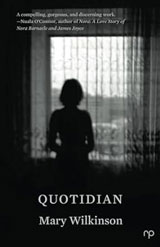
QUOTIDIAN by Mary Wilkinson (def: meaning the every day), might well have been titled
Around The World In Eighty Days. Or, Alice down the rabbit hole. Levels of deep change and intense
introspection dominate. Here is drama at its fundamental core. A lifetime(s) of rooms—passed through,
dreamt up, lived in, remembered, forgotten, then recalled. Transformative rooms, even during the just passing
through moments. I immediately bonded with the obsessed narrator who sees every so-called crack in the plaster.
As reader, I became the fly on the wall, the perverse peeping Tom, the interested party. There were times
I felt too interested; as if I had a stake in it. Lovely rooms, barren rooms, rooms inhabited by others.
Conversations, silence. Views, no views, terrible views. A cunning Miss C. flitting in and out.
It brought to mind water—how water carries things in; then the tides pull things away.
Often during this reading I felt the author's rhythm might be: Here today, gone tomorrow.
Wilkinson's 'Homemaker' begins:
"Sorry to say, but there are days when I am unable to proceed. It's as if none of this existed, and what I
have written and attempt to write further might just be but a figment of my imagination. /.../..."
QUOTIDIAN has a certain unobtrusive way of getting under the reader's skin.
How many of my own days have been marked with: 'but a figment'...
Homemaker continues:
"During this time I imagine a room with nothing in it. It is a pure white floating room with me in the middle,
breathing slowly and deeply in and out until I close my eyes and relax. /.../.../"
Wilkinson visualizes this room with nothing in it. Does this mean she cannot conceptualize her own presence
within the room, as well? It struck me that way on the first reading. The second time I felt nothingness in
the sense of total absence. Asking myself the question: But why should that room be totally empty—no matter
which way this piece inevitably takes you.
Her 'First Love' (which I've fragmented in the 2nd paragraph):
"I lay in a room not far from the sea where the seals in the harbor were to be heard barking incessantly, and the
foghorn sounding all night long was enough to soothe me through many sleepless hours...
[Everything was special... the promise of good coffee down the hall... I want to go towards it but something stops me...
it must only be a ghost rattling cups and saucers about... the bay window faced the sea, and the acacia trees beyond...
He was forever talking about the allergies... And poison ivy in the undergrowth too. Everything was a potential threat....
Hot nutty coffee served in tiny blue cups... he'd place the tray down on the old oak floorboards and climb back into bed
until we turned into out of control people... Oh the pleasure, the raw sex that had me forget about everything else.
Temporarily. /.../. ] "
There's a sense of poetry running through this prose, as well, with its lush lyricism. The exquisite detailing,
choking thoughts creeping like out of control vines, the meticulous narration and mysterious murmurings—conjuring
up a lifetime in rooms. Offered to us, the readers, for our introspection. I can see this beautiful Novella
transferred to film.
To Purchase Direct from Reflex Press: https://www.reflex.press/product/quotidian/
Available at other online sellers.
Visit the Author: https://www.marywilkinsonwriting.com/

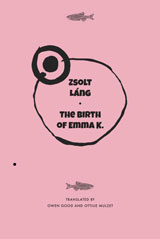
The Birth Of Emma K. by Zsolt Láng Translated by Owen Good and Ottilie Mulzet
Publisher: Seagull Books London Ltd
ISBN: 9780857429865
Number of pages: 200
There is often a profound awareness of uncertainty within Hungarian fiction. Whether it be parents who are prepared to miss
their beloved daughter when she leaves home for the first time only to discover they prefer her to be gone, poor villagers who
learn the guiding myth of their existence is as decrepit as they are, or newlyweds deeply in love who grow inexorably apart
during their honeymoon, the theme seems clear—nothing is ever what it seems, and one should accept this truth as quickly as
possible. The stories in The Birth Of Emma K., Zsolt Láng's English language debut, are not merely embedded in this tradition.
They take it to another dimension. Láng seems to relish not knowing, sometimes subtly and sometimes in a way that seems clumsy
until the clumsiness itself becomes another indeterminate variable. These are not stories for readers who want a fictionalized
world to roll out smoothly before them. These are stories about characters who live in an enigmatic world, who transform
as their world simultaneously changes. In "Like A Shaggy Ink Cap Mushroom," for example, a deeply frustrated police
inspector, who is under pressure from "Internal Operations" about a case, becomes death-obsessed. Is he suicidal,
or has his job investigating murders driven him into a match with death he can only win by dying? Is there a difference?
All is unsure as the story develops, but what is certain is that he looks out his window one morning, a window he has
looked out for years, and "his gaze [falls] upon the graveyard." Take note of the definite article because we learn in
the next sentence that him seeing the graveyard is nothing short of a miracle "considering the cemetery lay in the
opposite direction, on the far side of the Bureau." But the end of the paragraph is most telling: "This could only be
the divine work of Providence, thought the Inspector, who, like everything else, didn't believe in Providence."
When I read this passage I had a shimmer of a realization that allowed an aspect of the stories
in The Birth Of Emma K to fall into place, at least for that moment: unseen forces operate throughout these
stories, either before our eyes or in a background we are led to believe exists. This is from the first paragraph
of the opening story, "God on Gellert Hill:"
"Our Lord was ruminating over who gave him the power through which he created the Earth and the Sky and the living
creatures from clay. Who this boundless power came from. And if it was now his own, why wasn't it absolute.
Because it wasn't absolute."
We are told at the beginning that God is a character in the story and God is frustrated at his limits. Then,
before the paragraph is complete, we are told that the narrator wants to make one other thing clear:
"let's postulate that we're not talking about the Father or the Holy Ghost, we're talking about the Son,
and then we can confidently say that there stood the Son of God at the corner of Számado street and
Tünderlaki hollow." The Son of God, not God, is outside a villa, whose original builder may have been Hungarian
or may have been Italian, he didn't seem to know for certain,"dawdling in front of the porter's cabin,
which hadn't been built for a porter but for rubbish." All is quivering mercury in Láng's world.
The uncertainty at the core of these stories seems endless. The only thing we can take for granted is
that nothing can be taken for granted. The reader must be on the lookout as much as the characters. In
the story "Chestnut," in which two rival homeopathic doctors find themselves sharing a room and competing
to get a colleague's affection, we find out in the first paragraph that one of the doctors seems uncertain
about which name to use, but that is only the beginning of his uncertainty. He is also uncertain as to his
role in the story: "My name's Gyémánt, doctor Gyémánt, doctor Károly Gyémánt, he'd begin, if he were to
write this story in the first person." But Doctor Gyémánt, a man who is only comfortable when he is under
the illusion that he is in charge of his fate, isn't writing the story. In "Before Midnight" a Hungarian man
who finds himself in a Romanian music class is suddenly an expert on Béla Bartók. In "Madhouse," a patient in
a mental institution switches minds with a supervisor. The insistency of the theme makes it easy to understand
why some readers will be frustrated reading The Birth Of Emma K. There are times when one wishes for more
to hold onto, and other places where it isn't clear if Láng knows where he is going or how he arrived
where he is. This is perhaps inevitable and while it makes for intriguing meta-thoughts of how the
author himself has discovered he is no more in control than is poor Doctor Gyémánt, it can also
cause frustration. How much control writers have over their work is a valid and interesting question,
but it can also leave the reader with nothing to hold onto.
Then we come to the final, titular story and much of the frustration we may have had vanishes in its telling.
On the surface, it is a conventional story. A young man, Kovács Junior, is in a marriage destined to
never be happy. His wife wants nothing from him but to become pregnant and she has a litany of positions
and other techniques to help her attain her goal, all of which fail. Then one afternoon he has unexpected
afternoon sex with a cleaning girl at the school where he also has an unsatisfying job. The girl, Cecily,
who tells him repeatedly she loves him as she climaxes and apparently means it, ends up pregnant. As Láng says,
there was nothing unusual about [the baby's] conception, "she was the fruit of a customary, barely-three-minute act."
Unbeknownst to Junior, that evening, before he as even finished his pasta at dinner, the baby Emma K. is the size of
an ant egg.
After learning of the pregnancy, Junior's family, who is enraged at Cecily, the "slutty crackpot of a little
tart," tries various ways to cause her to lose the baby. At one point Cecily, who has washed her hair for the
occasion, shows up at Junior's house at six in the evening so the family can take turns punching her in the
stomach until "some kind of slow fluid began flowing down her thighs." It turns out to be sweat. Throughout
this ordeal, and the remainder of the story, we learn that the unborn Emma is determined to survive. Then,
in the end, after a terrifying description of the birth, Emma is born and we realize that our process of
bonding with the fetus is the same process the characters have gone through. It's as though they must stop
the life before Emma is born because at that point their love for her will render them helpless. It
reminds one of what Emerson says in "Self-Reliance" about the absolute power the cradled baby has
over the supposedly autonomous adult. In Láng's world, it means that the one character who has an
existence grounded in certainty is not the Son of God or the well-educated doctor. It is the unborn,
female child of a simple young man and an equally simple young woman. That is where Láng leaves us,
listening to the birth cries of a newborn who is already in many ways the oldest person on Earth. In
the end, through all the questions and uncertainty, it remains possible that life is a journey we can
be grateful we were allowed to take.

Cervena Barva Press is starting a fund-raiser for this year. Please donate $19.00. We have been around for 19 years so
I thought this was a perfect amount to ask for!!!! As you can see, we are not asking for a lot. You do not have to
break the bank to support our press. Any amount helps. Thank you.
See you next month
Gloria

Červená Barva Press Staff
Gloria Mindock, Editor & Publisher
Renuka Raghavan, Assistant Editor, Publicity
Flavia Cosma, International Editor
Helene Cardona, Contributing Editor
Andrey Gritsman, Contributing Editor
Juri Talvet, Contributing Editor
John Wisniewski, Interviewer
Karen Friedland, Interviewer
Miriam O' Neal, Poetry Reviewer
Annie Pluto, Poetry Reviewer
Christopher Reilley, Poetry Reviewer
Susan Tepper, Poetry Reviewer
Neil Leadbeater, Poetry Reviewer
John Riley, Poetry and Fiction Reviewer
William J. Kelle: Webmaster
Gene Barry (In Memoriam)
See you next month!


If you would like to be added to my monthly e-mail newsletter, which gives information on readings,
book signings, contests, workshops, and other related topics...
To subscribe to the newsletter send an email to:
newsletter@cervenabarvapress.com
with "newsletter" or "subscribe" in the subject line.
To unsubscribe from the newsletter send an email to:
unsubscribenewsletter@cervenabarvapress.com
with "unsubscribe" in the subject line.

Index |
Bookstore |
Our Staff |
Image Gallery |
Submissions |
Newsletter |
Readings |
Interviews |
Book Reviews |
Workshops |
Fundraising |
Contact |
Links
Copyright @ 2005-2024 ČERVENÁ BARVA PRESS - All
Rights Reserved
|

